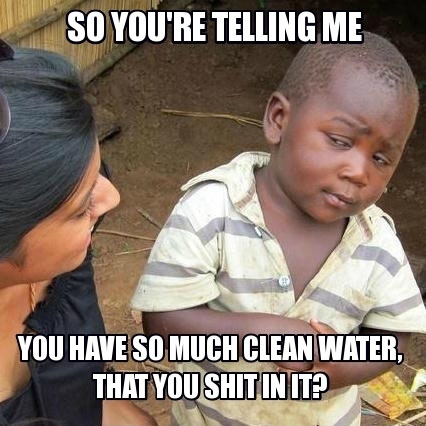Today was the last day of class in my Green Communities class. A fellow student mentioned that the average American household uses nearly 200 gallons of water per day, while the average African household uses a mere 5 gallons of water per day. Our professor followed that up by showing us the meme shown above.
In the developed world, it’s pretty much a given that culinary water is used to flush toilets, and we’ve been doing it for so long that few dare question why. The reality is that there’s really no reason to use culinary water to flush toilets. Rainwater collected from roofs would do just fine as would graywater–the wastewater from our showers and from our washing machines.
So, why do we shit in our clean water???
Subsidies — typically economic subsidies — are a concept familiar to most. Society decides that something worthwhile–something typically not economically viable on its own–needs some encouragement, which usually comes in the form of economic support from the general tax fund. Prior to taking the Green Communities class, I had never considered applying the concept of subsidies to an ecological system. Hence, an ecological subsidy occurs when a resource is imported in order to support human civilization, where it wouldn’t otherwise be viable. Ecological subsidies aren’t anything new. The human race has been engaging in them for millennia. However, it becomes a crisis, when the ecological subsidies become extreme, such as can be observed with water and energy in the developed world. Los Angeles’ thirst for water is the perfect example. Years ago this thirst drove them to rape the Owens Valley in their quest of obtaining new sources of water. The irony is that much of the thirst could have been quenched using conservation techniques, such as reusing graywater.
Another downside of extreme ecological subsidies is that the price we typically pay for consuming them rarely includes the overall cost borne by the whole. Since the consumer is unaware of the true cost, there is no incentive for conservation. If the consumer were paying the true cost, far fewer people would be using culinary water to flush their toilets. Strong Towns, which is run by Charles Marohn (whom I met at CNU 21), makes a compelling argument that one source of our national debt is from borrowing money in order to support our addiction to ecological subsidies.
Unfortunately, I have no clue how much water my household consumes. I own a townhome in a 92-unit development, where it was cheaper for the developer to install one commercial water meter than 92 residential meters. Water, along with sewer and trash collection, is paid for as part of the homeowners association dues, which doesn’t give much of an incentive for water conservation. In fact, it’s been a decade, since the last time I lived in a single-family home, where the household’s water was metered. Ensuring that future construction includes individual water meters for each household would be a great step towards encouraging water conservation.


